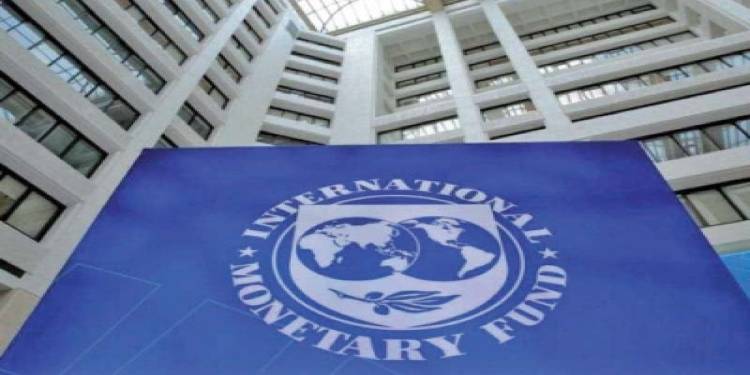
In light of the country's severe economic upheaval, the International Monetary Fund (IMF) voiced optimism on Wednesday that a staff-level agreement (SLA) would soon be reached with Pakistan.
Jihad Azour, the director of the IMF's Middle East and Central Asia Department, made the remarks while speaking with a team from Pakistan that was in the country to attend the IMF/World Bank Spring Meetings.
According to a statement released by the Finance Division, Finance Minister Ishaq Dar joined the meeting from Islamabad using Zoom.
The announcement added that "Jihad Azour expressed his confidence that the Staff Level Agreement (SLA) will be signed soon followed by the IMF Board's approval," which is encouraging for the beleaguered country.
Azour hoped that Pakistan will continue on its path of reforms in a number of areas and finish the plan on schedule and that "the IMF will play its positive role in bringing economic stability to Pakistan."
Pakistan has completed all preparatory steps necessary to obtain the IMF loan tranche, and friendly country guarantees are the only thing keeping the project from moving forward.
Saudi Arabia has already promised $2 billion in funding, and reports indicate that the United Arab Emirates (UAE) will likely guarantee the global lender that it will give Pakistan $1 billion by this week. These developments bring the $350 billion economy closer to obtaining the loan.
The money is part of a bailout package of $6.5 billion that the IMF authorized in 2019, which analysts say is essential for Pakistan to avoid defaulting on its responsibilities for external payments.
The agreement would also open up additional bilateral and multilateral funding options for Pakistan, which will stabilize its foreign exchange reserves, which have decreased to only four weeks' worth of import coverage, and help it avoid a balance of payments crisis.
The IMF has reduced Pakistan's growth forecast from the earlier 2% estimate to 0.5% as the country struggles with a dollar shortage, causing supply chain delays and business shutdowns.
The two parties discussed the implementation of earlier initiatives and the progress made with the ongoing IMF program during today's meeting, focusing on the discussions had with the IMF mission during their visit to Pakistan.
The finance minister informed the Fund officials that he had to postpone his trip to Washington, DC because Prime Minister Shehbaz Sharif ordered him to stay in Pakistan due to pressing obligations there.
He informed the IMF delegation of the nation's economic difficulties. Dar also discussed the government's plans for achieving macroeconomic stability in the nation.
Ishaq Dar further stated that the government is completely committed to upholding its duties as outlined in the agreement with the IMF and that all earlier activities for the ninth review under the Extended Fund Facility have already been completed.
Jihad Azour, the director of the IMF's Middle East and Central Asia Department, made the remarks while speaking with a team from Pakistan that was in the country to attend the IMF/World Bank Spring Meetings.
According to a statement released by the Finance Division, Finance Minister Ishaq Dar joined the meeting from Islamabad using Zoom.
The announcement added that "Jihad Azour expressed his confidence that the Staff Level Agreement (SLA) will be signed soon followed by the IMF Board's approval," which is encouraging for the beleaguered country.
Azour hoped that Pakistan will continue on its path of reforms in a number of areas and finish the plan on schedule and that "the IMF will play its positive role in bringing economic stability to Pakistan."
Pakistan has completed all preparatory steps necessary to obtain the IMF loan tranche, and friendly country guarantees are the only thing keeping the project from moving forward.
Saudi Arabia has already promised $2 billion in funding, and reports indicate that the United Arab Emirates (UAE) will likely guarantee the global lender that it will give Pakistan $1 billion by this week. These developments bring the $350 billion economy closer to obtaining the loan.
The money is part of a bailout package of $6.5 billion that the IMF authorized in 2019, which analysts say is essential for Pakistan to avoid defaulting on its responsibilities for external payments.
The agreement would also open up additional bilateral and multilateral funding options for Pakistan, which will stabilize its foreign exchange reserves, which have decreased to only four weeks' worth of import coverage, and help it avoid a balance of payments crisis.
The IMF has reduced Pakistan's growth forecast from the earlier 2% estimate to 0.5% as the country struggles with a dollar shortage, causing supply chain delays and business shutdowns.
The two parties discussed the implementation of earlier initiatives and the progress made with the ongoing IMF program during today's meeting, focusing on the discussions had with the IMF mission during their visit to Pakistan.
The finance minister informed the Fund officials that he had to postpone his trip to Washington, DC because Prime Minister Shehbaz Sharif ordered him to stay in Pakistan due to pressing obligations there.
He informed the IMF delegation of the nation's economic difficulties. Dar also discussed the government's plans for achieving macroeconomic stability in the nation.
Ishaq Dar further stated that the government is completely committed to upholding its duties as outlined in the agreement with the IMF and that all earlier activities for the ninth review under the Extended Fund Facility have already been completed.

